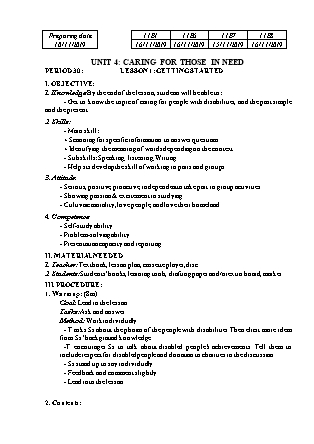Giáo án Tiếng Anh Lớp 11 (Thí điểm) - Unit 4: Caring for those in need - Lesson 1: Getting started - Năm học 2019-2020

I. OBJECTIVE:
1. Knowledge: By the end of the lesson, students will be able to:
- Get to know the topic of caring for people with disabilities, and the past simple and the present.
2. Skills:
- Main skill:
+ Scanning for specific information to answer questions
+ Identifying the meaning of words depending on the context
- Sub skills: Speaking; listening; Writing
- Help sts develop the skill of working in pairs and groups
3. Attitude:
- Serious, positive, proactive, independent to take part in group activities.
- Showing passion & excitement in studying
- Cultivate morality, love people, and love their homeland
4. Competence:
- Self-study ability
- Problem-solving ability
- Presentation capacity and reporting
II. MATERIAL NEEDED
1. Teacher: Textbook, lesson plan, cassette player, disc.
2. Students: Students’ books, learning tools, drafting paper and/or extra board, marker
Preparing date 11B1 11B6 11B7 11B8 10/11/2019 16/11/2019 16/11/2019 15/11/2019 16/11/2019 UNIT 4: CARING FOR THOSE IN NEED PERIOD 30: LESSON 1: GETTING STARTED I. OBJECTIVE: 1. Knowledge: By the end of the lesson, students will be able to: - Get to know the topic of caring for people with disabilities, and the past simple and the present. 2. Skills: - Main skill: + Scanning for specific information to answer questions + Identifying the meaning of words depending on the context - Sub skills: Speaking; listening; Writing - Help sts develop the skill of working in pairs and groups 3. Attitude: - Serious, positive, proactive, independent to take part in group activities. - Showing passion & excitement in studying - Cultivate morality, love people, and love their homeland 4. Competence: - Self-study ability - Problem-solving ability - Presentation capacity and reporting II. MATERIAL NEEDED 1. Teacher: Textbook, lesson plan, cassette player, disc. 2. Students: Students’ books, learning tools, drafting paper and/or extra board, marker III. PROCEDURE: 1. Warmup: (8m) Goal: Lead in the lesson Tasks: Ask and answer Method: Work individually - T asks Ss about the photos of the people with disabilities. Then elicit more ideas from Ss’ background knowledge. -T encourages Ss to talk about disabled people’s achievements. Tell them to include respect for disabled people and donation to charities in the discussion. - Ss stand up to say individually - Feedback and comment slightly - Lead into the lesson 2. Contents: Teacher’s activities Students’ activities ACTIVITY 1: Listen to the teacher’s introduction (5m) Aim: Sts get to know about the unit Method: Work with the whole class - Introduces the unit and the first part. T may begin by asking Ss about the picture. Who do you see in the picture? What are they doing? What do you think they are going to do with the gift? - Ask Ss to focus on the yellow box to inform the main points of the whole unit - Look at the pictures and the yellow box to answer the questions and then take notes. - Many sts are preparing things to send to the people who need them. ACTIVITY 2: Listen and read (12 m) Aims: Sts listen and read the conversation to understand more about the topic Methods: Work individually - Play the recording for Ss to listen and read the conversation at the same time. - Tell sts not to worry about the new words or grammar points. - Explain some new words 1. blind (adj): 2. deaf (adj) 3. dumb(adj)= mute 4. disable (v)làm tàn tật →disabled (adj) 5. cognitive (adj) lien quan đến nhận thức 6. impair (v) làm suy yếu → impairment (n) 7. Respect (v) for → respectful (adj)# disrespectful 8. integrate into ST - Ask sts to read the new words in chorus and individually - Listen and read the conversation - Listen and take notes the vocabulary - Read the new words in chorus and individually ACTIVITY 3: Read and decide whether the statements are true or false or not given (10m) Aims: Sts practice reading skills Methods: Work in pairs - Ask sts to work in pairs to decide whether the statements are true (T), false (F), or not given (NG) - Call on some sts to give theirs answers and explain why. - Ask others to give comments. - Feedback - Do the task in pairs - Give the answers. - Give comments. - Check and take notes 1. T 2. F 3. NG 4. T 5. NG ACTIVITY 4: Discuss (8m) Aims: Sts understand and get responsibility in the way to treat with disabilities Methods: Work in groups - Ask Ss to work in groups of three or four to do this task - Suggest some questions: 1. How do non-disabled people think about disabled one? 2. Do you believe that disabled people can live independently and make their contributions to the society? 3. Can you give some examples of people who overcome their disabilities to succeed in life? 4. What should we do to help disabled people? - Work in groups to discuss Expected answers: 1. Non-disabled people often feel sorry for people with disabilities. - Many people think disabled people are burdens to their family and the society - I think non-disabled people used to think that people with disabilities always need to be looked after. However, attitudes have changed. 2. Many people think that disabled people can do nothing and can't live independently. - People with disabilities are now perceived as valued members of society. 3. Nguyen Ngoc Ky Nick Vujicic 4. We can listen to their problems, give them encouragements, and help 3. Consolidation and homework a. Consolidation: (1m) - Teacher summaries main points of the lesson - Students listen and add some more points b. Homework: (1m) - Do the task again - Prepare the next lesson at home.
Tài liệu đính kèm:
 giao_an_tieng_anh_lop_11_thi_diem_unit_4_caring_for_those_in.docx
giao_an_tieng_anh_lop_11_thi_diem_unit_4_caring_for_those_in.docx



